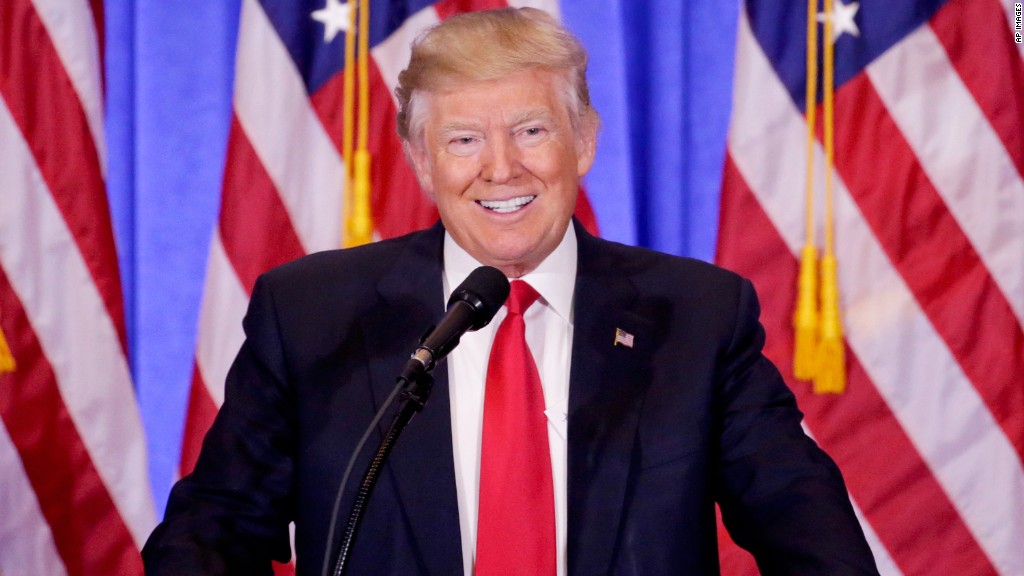
Wall Street has kicked off the Trump presidency with a bounce.
The Dow jumped about 95 points on Friday following the swearing in of Donald Trump as America's 45th president.
During the inaugural address, the new president promised to follow through on his campaign pledge to protect American jobs.
"We must protect our borders from the ravages of other countries making our products, stealing our companies and destroying our jobs," Trump said.
He emphasized that his administration will follow two simple rules: "Buy American and hire American."
Trump sought to bring the country together following a turbulent election.
"When America is united, America is totally unstoppable," Trump said.
Related: Trump market rally on hold, but may not be over
Wall Street has been on an upswing ever since Trump's historic upset of Hillary Clinton, though the euphoria known as the "Trump rally" has waned in recent weeks.
After an overnight selloff on election night, the stock market welcomed Trump with a bang as the Dow soared 257 points the day after the election. Eventually, the Dow would surge more than 1,400 points between the election and the end of the year.
All told, the U.S. market has gained $1.4 trillion in value since the election, according to S&P Dow Jones Indices.
Instead of worrying about the inherent uncertainty brought on by a Trump administration, investors have focused on the potential upside of his pro-growth agenda. Wall Street is betting Trump's plans to slash taxes, cut regulation and unleash infrastructure spending will accelerate the U.S. economy and create a windfall for corporate profits.
"There was a shifting sentiment among investors that an era of difficult operating conditions for business was about to be lifted," said David Joy, chief market strategist at Ameriprise Financial.
Trump is taking power under decidedly different times than President Obama did. The U.S. unemployment rate is sitting near a nine-year low and the economy has added jobs for a record 75 straight months.
"It's night and day," said Ameriprise's Joy. "Trump is getting a nice tailwind from the economy. Conditions on the ground seem to be pretty healthy right now."
Related: What's at stake for U.S. in trade war with China
But investors have hit pause on the Trump rally in recent weeks, waiting for more details on precisely when the stimulus plans will take effect and how powerful they will be.
"The hope and promise of pro-growth and pro-business is meeting the reality that Washington is still a complicated place," said Art Hogan, chief market strategist at Wunderlich Securities.
"It will take time for tax reform, repealing Obamacare and infrastructure," he said.
Wall Street is also on guard for signs that Trump's tough talk on trade could spark a trade war with China or Mexico that could grind global growth to a halt.
During his speech, Trump said that his administration will "seek friendship and good will" with other countries, but emphasized it is "the right of all nations to put their own interests first."
Wilbur Ross, Trump's pick for commerce secretary, suggested the new administration will take a tough stance against China, which he called "the most protectionist country." China has said it wants to talk about trade with Trump, but Beijing has signaled it won't hesitate to retaliate.
Wall Street is also waiting to see whether Trump takes immediate action on some of his proposals by signing executive orders on his first day in office. Trump told supporters at a luncheon on Thursday that he is preparing to sign "some papers that will be very meaningful tomorrow right after the speech to get the show going."
History shows that Inauguration Day can at times bring about significant moves in the stock market. For instance, the S&P 500 plummeted 5% the day after President Obama's 2009 inauguration, but then soared 5% the next day. Of course, those moves reflect the turbulence of the financial crisis that Obama inherited.
Despite that scary start, Wall Street enjoyed a lucrative eight years under Obama. The S&P 500 is up 166% since Obama took office, underscoring the consistent, albeit disappointing, economic recovery from the Great Recession.


